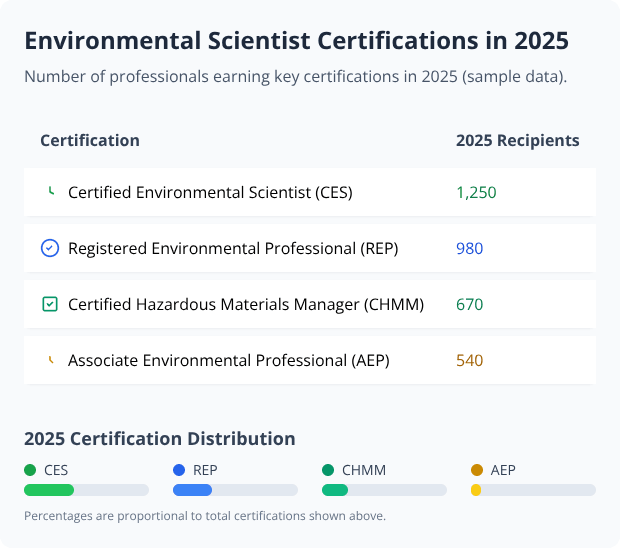Environmental Scientist Resume Certifications

Think of certifications as the trail markers guiding hiring managers through the jungle of your resume—without them, you’re just another eager explorer in a crowded field. This article is your compass, revealing which credentials actually matter and how to flaunt them with flair. Get ready to give your resume some serious eco-muscle.
The Value of Certifications in Environmental Scientist
A certification pinned to your name whispers, “This person knows their stuff,” to employers and colleagues alike. It’s not just a piece of paper—it’s proof of lived expertise, a track record of standards met and knowledge mastered that goes well beyond a college degree. In a field where the stakes of mistakes can be sky-high, certifications tip the scales, turning uncertainty into trust. When a stack of resumes blends into a blur, those extra credentials gleam like a beacon, making one candidate distinctly hard to overlook.

Adding a certifications section to your resume can really boost your chances, especially for environmental scientist jobs that demand proven expertise.
Best Certifications to Add to Your Environmental Scientist Resume
Certified Environmental Scientist (CES)
Validates comprehensive understanding of key environmental science concepts and best practices, serving as a widely recognized mark of professional competence.Certified Hazardous Materials Manager (CHMM)
Demonstrates expertise in the management, handling, and disposal of hazardous materials, crucial for regulatory compliance and workplace safety.Certified Environmental Professional (CEP)
Distinguishes those who have achieved advanced knowledge and experience across a spectrum of environmental disciplines, setting them apart in the field.LEED Accredited Professional (LEED AP)
Signals proficiency in green building strategies and sustainable site design, invaluable for scientists working with construction, urban planning, or development.Registered Environmental Manager (REM)
Highlights leadership abilities in environmental management and regulatory programs, often a requirement for senior roles in both public and private sectors.Professional Wetland Scientist (PWS)
Designates specialized skills in wetland science, assessment, and management - a niche often required for ecosystem-focused projects.OSHA Hazardous Waste Operations and Emergency Response (HAZWOPER) Certification
Confirms readiness to safely handle hazardous waste, a baseline credential for fieldwork involving potential contamination or cleanup.
DO'S
- Show relevant certifications prominently near the top of your resume.
- Use the exact title and awarding institution for each certification.
- Include valid dates and mention expiration or renewal status if applicable.
DON'TS
- Don't list expired or irrelevant certifications.
- Don't clutter the section with obscure acronyms without explanations.
- Don't exaggerate or claim certifications you haven’t actually earned.
Pro Tip: Spotlight the certifications that really matter, and suddenly your resume shouts expertise instead of whispering generalities; hiring managers want proof you know your stuff, not a jumble of outdated badges.



